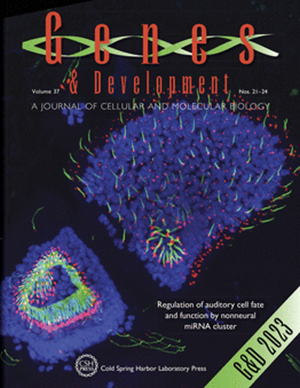BCL11b 对真皮脂肪组织的发育调控
IF 7.5
1区 生物学
Q1 CELL BIOLOGY
引用次数: 0
摘要
脂肪组织在器官发生过程中形成的独特解剖环境是决定其成年扩张能力的主要因素。代谢性疾病源于真皮/皮下脂肪库内增生性脂肪扩张不足;因此,了解真皮脂肪的胚胎起源至关重要。我们利用小鼠胚胎发育过程中的单细胞转录组学,鉴定了调控真皮白色脂肪组织(dWAT)发育的细胞群,包括 Bcl11b+ 细胞。我们发现,BCL11b的表达调节了Wnt信号微环境,从而使真皮区的成脂分化成为可能。皮下和内脏脂肪来源于胚胎器官形成过程中独特的Nefl+细胞群,而Pi16+/Dpp4+纤维脂肪生成祖细胞则支持肥胖刺激下的成人肥厚性扩张。总之,这些结果凸显了解剖学上不同的脂肪库所使用的独特调控途径,对人类代谢性疾病具有重要意义。本文章由计算机程序翻译,如有差异,请以英文原文为准。
Developmental regulation of dermal adipose tissue by BCL11b
The distinct anatomic environment in which adipose tissues arise during organogenesis is a principle determinant of their adult expansion capacity. Metabolic disease results from a deficiency in hyperplastic adipose expansion within the dermal/subcutaneous depot; thus, understanding the embryonic origins of dermal adipose is imperative. Using single-cell transcriptomics throughout murine embryogenesis, we characterized cell populations, including Bcl11b+ cells, that regulate the development of dermal white adipose tissue (dWAT). We discovered that BCL11b expression modulates the Wnt signaling microenvironment to enable adipogenic differentiation in the dermal compartment. Subcutaneous and visceral adipose arises from a distinct population of Nefl+ cells during embryonic organogenesis, whereas Pi16+/Dpp4+ fibroadipogenic progenitors support obesity-stimulated hypertrophic expansion in the adult. Together, these results highlight the unique regulatory pathways used by anatomically distinct adipose depots, with important implications for human metabolic disease.
求助全文
通过发布文献求助,成功后即可免费获取论文全文。
去求助
来源期刊

Genes & development
生物-发育生物学
CiteScore
17.50
自引率
1.90%
发文量
71
审稿时长
3-6 weeks
期刊介绍:
Genes & Development is a research journal published in association with The Genetics Society. It publishes high-quality research papers in the areas of molecular biology, molecular genetics, and related fields. The journal features various research formats including Research papers, short Research Communications, and Resource/Methodology papers.
Genes & Development has gained recognition and is considered as one of the Top Five Research Journals in the field of Molecular Biology and Genetics. It has an impressive Impact Factor of 12.89. The journal is ranked #2 among Developmental Biology research journals, #5 in Genetics and Heredity, and is among the Top 20 in Cell Biology (according to ISI Journal Citation Reports®, 2021).
 求助内容:
求助内容: 应助结果提醒方式:
应助结果提醒方式:


